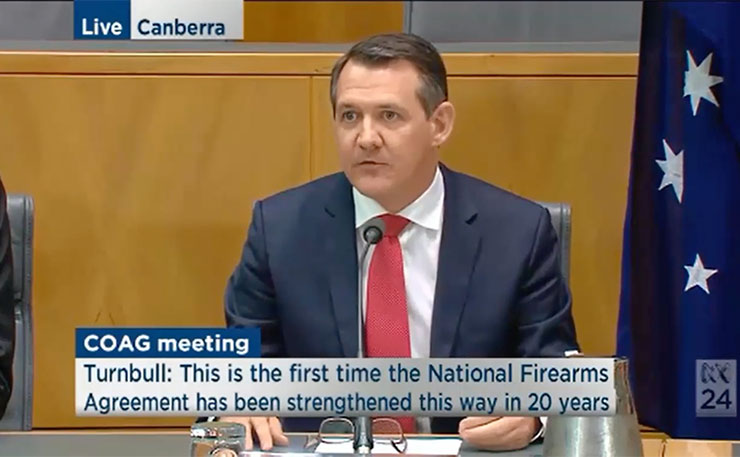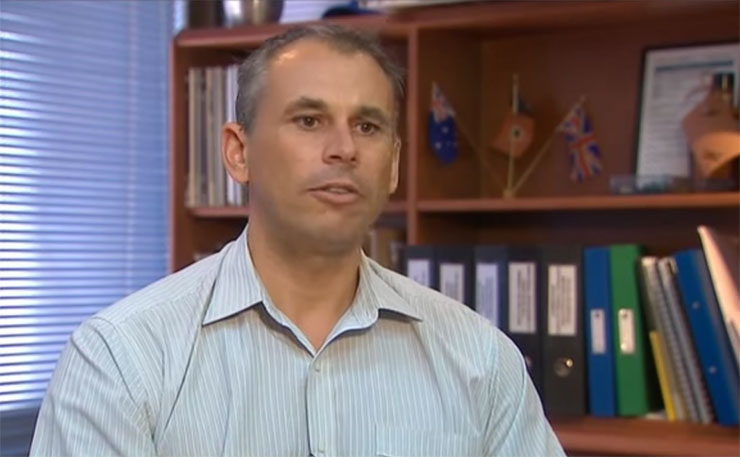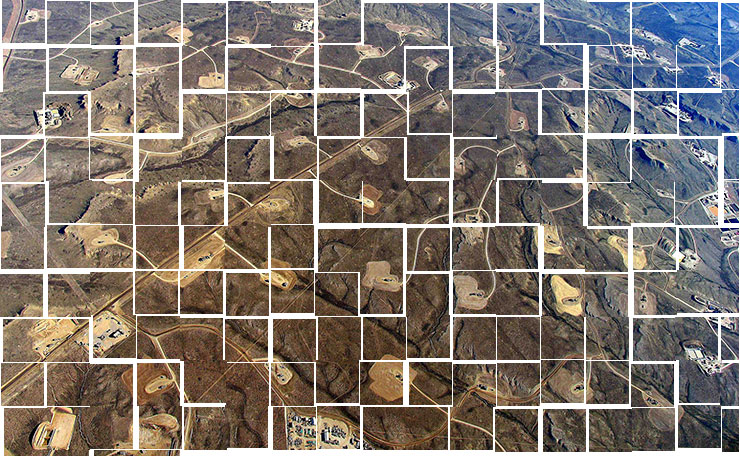The Top End stands on the precipice of a fracking future. Lauren Mellor explains.
The Northern Territory has been in the spotlight this week as a target for outrage over our recently implemented moratorium on gas fracking. Apparently in doing so the Territory has overlooked the important role it could play in responding to the East Coast gas market crunch… by standing aside while the gas industry fracks roughly 85 per cent of it.
As the results of a gas industry plan to raise record profits by creating a domestic supply crisis have begun to bite consumers, amid price gouging and threats of impending blackouts, our ‘innovation’ Prime Minister Malcolm Turnbull believes he has found a solution for more gas.
This week Turnbull gathered the CEOs of Australia’s biggest gas companies together for a stern talking to.
The gas giants are predictably railing against a simple domestic gas reservation policy that could harm their profits. In return Turnbull is continuing to pick on easy targets, blame shifting onto the States and Territories for restricting supply. With industry encouragement, the Federal Government is eyeing off the Northern Territory’s untapped shale gas reserves, calling for the need to lift that ‘silly’ fracking moratorium and get to work on a planned export pipeline to get all that gas to market.
But new gasfields in the Territory will do nothing to alleviate the industry’s orchestrated East Coast market chaos now putting thousands of jobs, businesses and households at risk.
The gas industry has made clear it has no interest in providing gas at prices affordable to those places struggling to heat homes and run businesses. The same companies who colluded to treble the domestic gas price in recent years will, in the absence of Federal Government intervention, happily continue to sell to whoever will pay the highest price.
Sure, some might argue the simple ‘increase supply’ solutions championed by Turnbull are just more of the same policy prescription that got the East Coast gas market into such a mess, but 10 points for the guy just trying to please his big political donors.
New gasfields no solution to East Coast crisis
The new Gunner Labor Government rolls out the first round of community consultations this month as part of its Inquiry into Hydraulic Fracturing. It faces its first important test of legitimacy on its promise to restore trust and transparency on an issue paramount to its election success.
Territory communities have made clear that they consider the prospect of fracking gasfields a major threat to their land, water and many livelihoods. The Territory’s powerful pastoral sector has broken ranks with the Country Liberal Party to call for the right to say no to invasive mining, while Indigenous and non-Indigenous landholders and communities have joined forces to rally, door-knock their neighbours and declare whole regions off-limits to gas fracking.

The Inquiry promised a clear-eyed scientific assessment of the risks of unconventional gasfields. Yet the end of 2017 deadline to report on the far-reaching terms of reference means the scientific panel, chaired by Justice Rachel Pepper, is likely to be just scratching the surface of the industry’s problems.
This rushed timeframe risks being further undermined by a decision expected within weeks on whether to approve the Northern Gas Pipeline, a 622km project that would connect Territory gas to Australia’s East Coast for the first time.
Labelled ‘nation building’ by its architect, former Chief Minister Adam Giles, whose ‘frack the lot’ legacy contributed to his government’s resounding defeat at last year’s election, the pipeline project has been fast-tracked through assessments at breakneck speed.
But could the project, once hailed as the economic panacea for a flailing Territory economy, actually be its undoing?
When asked whether the Northern Gas Pipeline would expose the Territory to the same price hikes and supply crunch currently crippling the East Coast gas market, Chief Minister Gunner insisted the Territory could sell its excess supply of gas to underpin a new export market.
But the project’s proponent Jemena, jointly owned by the Chinese and Singaporean governments, is more upfront about its reliance on new supplies of gas.
In its Environmental Impact Statement Jemena lists the project purpose is to ‘stimulate the development of the Northern Territory through increased gas exploration and production’. It has previously boasted about the pipeline’s ability to drive the development of new onshore (read: fracking) gasfields.
To the business press, Jemena is ambitious about the pipeline’s export potential. Executive General Manager of Business Development Antoon Boey told an industry convention in August, “This is the first step of a much larger picture and we’re keen to see more incentives for upstream developers to get on and develop gas, which would enable us to make an expansion of the pipeline, or even an extension of it down into the big demand centres of Curtis Island.”
Likely the promise of the East Coast gas market, where domestic customers are now forced to pay three times pre-export capacity prices, is appealing. In Jemena’s rush to get gas flowing thousands of lengths of pipe are starting to be stockpiled in Tennant Creek. This despite the fact the inquiry into hydraulic fracturing, environmental assessments and land access negotiations are still underway.
But this high stakes risk-taking backfired spectacularly this month when Jemena was forced to announce it had not secured agreement from two critical Aboriginal Land Trusts along the pipeline route, going back on public claims it made in December 2016.
Representatives of the Waramungu and Wakaya Land Trusts claim the company lied about the project’s reliance on fracked gas during consultation meetings to assuage Traditional Owner’s concerns. The Wakaya people have previously called the land access negotiation process a sham and walked out of consultations after bullying by the pipeline company.

Dianne Stokes from the Waramungu Land Trust said, “The company told us during consultations that the pipeline was not related to fracking, but we feel Jemena is speaking with a forked tongue. Jemena are keeping landowners in the dark to silence concerns about fracking while elsewhere promoting its plans to transport unconventional gas.”
Max Priest from the Wakaya Last Trust issued a statement calling on the NT Government to implement a fracking ban to guarantee the pipeline project would not result in pressure for new gasfields.
“We said numerous times that we do not want anything to do with fracking, as the impact it has on the environment would be devastating both for our water, community, animals and landscape.
“We want the NT Government to start listening us, and deal with the concerns that are being raised about this pipeline, not continue ignoring our people.”
The groups have challenged the Land Council’s authority to consent to the project on their behalf, forcing Jemena to delay its stated April project start date indefinitely and re-tender major construction contracts.
While Waramungu and Wakaya opposition to the pipeline transporting fracked gas may not be enough to stop the project, all Territorians have an interest in calling on the Chief Minister to abandon the proposal. Without a guarantee of a permanent ban, the pipeline will act as a market driver posing a real and present danger to any community targeted for fracking gasfields.
85 per cent of the Territory is under application for shale gas exploration permits including pastoral, rural and remote landholdings and waterways, iconic tourism icons like the Mataranka thermal springs, and wholly surrounding Uluru and Kata Tjuta National Park.

For these places the risk is that the pipeline could suddenly make development of new fracking gasfields economic to exploit. It’s a source of major concern to communities who less than a year ago voted overwhelming for a moratorium on fracking.
If the Chief Minister is to be taken at his word, then any approval of the pipeline during its own fracking inquiry’s community consultation phase would be a significant undermining of these commitments.
If regional and remote community consultations scheduled this week go the way of the urban hearings from Alice Springs to Darwin, where overwhelming support for a Territory-wide fracking ban has been demonstrated, the Gunner Government will have a hard time explaining to voters why it has offered support to a project designed primarily to drive exports of new fracked gas.
The good news is that the NT Government is not bereft of vision in the energy policy space. Its Roadmap to Renewables Inquiry, currently underway, offers a pathway to achieving a 50 per cent renewable energy target by 2030. In sharp contrast to the high-risk and low return nature of a fracked gas export industry, its renewables policy enjoys broad support for the potential to bring clean energy to our regional and remote areas and reduce electricity prices while creating local, skilled employment. While at the same time making good on its commitments for critical climate action.
Turnbull is playing desperate politics to deflect blame from the Federal Government’s role in allowing the gas industry to ramp up exports and manufacture a domestic supply crisis. Yet the Gunner Government does us no favours by pandering to the gas industry and their pipe dreams.
The choice for our Chief Minister is clear. He could give a green light to the Northern Gas Pipeline and expose the Territory to the type of price chaos that has marked the East Coast’s mistaken foray into exports, while locking us into decades of dirty gasfields.
Or, he could stand with the thousands of ordinary Territorians calling for a fracking ban to safeguard our future.
Whichever way he moves one thing is certain, a growing movement against fracking will ensure his government is held to account.
Donate To New Matilda
New Matilda is a small, independent media outlet. We survive through reader contributions, and never losing a lawsuit. If you got something from this article, giving something back helps us to continue speaking truth to power. Every little bit counts.





